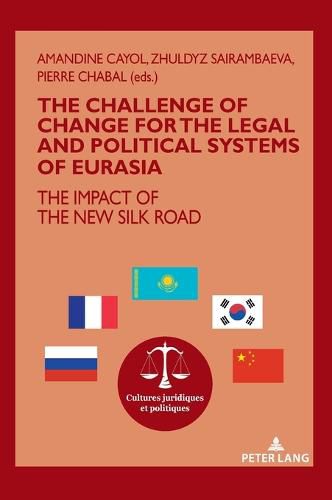Readings Newsletter
Become a Readings Member to make your shopping experience even easier.
Sign in or sign up for free!
You’re not far away from qualifying for FREE standard shipping within Australia
You’ve qualified for FREE standard shipping within Australia
The cart is loading…






This title is printed to order. This book may have been self-published. If so, we cannot guarantee the quality of the content. In the main most books will have gone through the editing process however some may not. We therefore suggest that you be aware of this before ordering this book. If in doubt check either the author or publisher’s details as we are unable to accept any returns unless they are faulty. Please contact us if you have any questions.
After reflecting On the European and Asian origins of legal and political systems: views from Korea, Kazakhstan and France (2018), the authors address in this book three intertwined issues. First, how systems that were established long ago are challenged by the necessity to adapt to change both in time, rapidly after the end of the cold war, and in space, across the continent of Eurasia and no longer ‘simply’ in their sub-region. Second, how these systems evolve both in a sui generis manner and adopt, each for itself, reforms at the national and sub-regional levels; and also in a reciprocal manner, learn and borrow from each other towards a ‘regional legal order’ in the making. Third, how extra-judicial evolutions, such as the logistical and commercial dynamics of the Belt and Road Initiative(s) appear more and more as the source or the cause of that very change affecting all Eurasian actors and interests. Examined elsewhere from a broad social sciences perspective, in the publication Cross-border exchanges: Eurasian perspectives on logistics and diplomacy (2019), these issues are here systematically analysed by a mix of conceptual and doctrinal perspectives and of textual, jurisprudential and positivist perspectives. Naturally, the challenge within the challenge to ascertain is whether a pan-regional or global legal ‘model’ would be capable of impacting change in general and legal change in particular as part of the ‘post-cold-war 2:’, where the political-military legacy is overcome by and yields to business concerns reaching beyond cautious legal constructions.
$9.00 standard shipping within Australia
FREE standard shipping within Australia for orders over $100.00
Express & International shipping calculated at checkout
This title is printed to order. This book may have been self-published. If so, we cannot guarantee the quality of the content. In the main most books will have gone through the editing process however some may not. We therefore suggest that you be aware of this before ordering this book. If in doubt check either the author or publisher’s details as we are unable to accept any returns unless they are faulty. Please contact us if you have any questions.
After reflecting On the European and Asian origins of legal and political systems: views from Korea, Kazakhstan and France (2018), the authors address in this book three intertwined issues. First, how systems that were established long ago are challenged by the necessity to adapt to change both in time, rapidly after the end of the cold war, and in space, across the continent of Eurasia and no longer ‘simply’ in their sub-region. Second, how these systems evolve both in a sui generis manner and adopt, each for itself, reforms at the national and sub-regional levels; and also in a reciprocal manner, learn and borrow from each other towards a ‘regional legal order’ in the making. Third, how extra-judicial evolutions, such as the logistical and commercial dynamics of the Belt and Road Initiative(s) appear more and more as the source or the cause of that very change affecting all Eurasian actors and interests. Examined elsewhere from a broad social sciences perspective, in the publication Cross-border exchanges: Eurasian perspectives on logistics and diplomacy (2019), these issues are here systematically analysed by a mix of conceptual and doctrinal perspectives and of textual, jurisprudential and positivist perspectives. Naturally, the challenge within the challenge to ascertain is whether a pan-regional or global legal ‘model’ would be capable of impacting change in general and legal change in particular as part of the ‘post-cold-war 2:’, where the political-military legacy is overcome by and yields to business concerns reaching beyond cautious legal constructions.